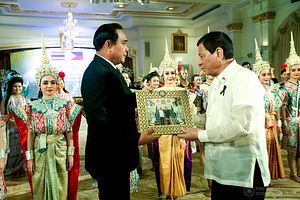Earlier this month, the Philippines and Thailand finally completed necessary arrangements and held the first iteration of their new joint committee for military cooperation. The little-noticed move is nonetheless significant within the context of bilateral security collaboration between the two Southeast Asian states amid the challenges they are facing.
Thailand and the Philippines, both U.S. treaty allies in Southeast Asia, have long shared common concerns in the defense realm, ranging from counterterrorism to other transnational crimes such as drug trafficking and smuggling. They have also played key roles in contributing to minilateral and multilateral cooperation within the broader ASEAN context at various points, with two recent examples being Thailand’s role in setting up the ASEAN Center for Military Medicine (ACMM) officially launched last April to the Philippines’ leadership in calling for a cybersecurity working group within the ASEAN Defense Ministers’ Meeting Plus (ADMM-Plus) that was finally approved in June 2016.
The need for greater cooperation on these challenges has arguably only grown in recent years, particularly under the Thai military junta led by Prayut Chan-o-cha that assumed power following a coup in 2014 and Philippine strongman Rodrigo Duterte who took office last year. Both leaders have placed even more of a focus on such security issues amid a series of developments including the Marawi crisis in May. When the two leaders met in Bangkok in March, Duterte said that the two countries had vowed to strengthen collaboration “to effectively address these scourges and menace to our societies” through a series of measures including better information-sharing and intelligence exchange.
At the time, both leaders also acknowledged in their statements that one important way to get to this greater level of cooperation would be through the setting up of a Joint Committee on Military Cooperation (JCMC), which had been talked about even before Duterte came to power and they had hoped to get going soon this year. And though there has been some delay, on August 17 both sides finally signed the terms of reference (TOR) for the JCMC.
The signing, which was done by Philippine Department of National Defense Undersecretary Cardozo M. Luna and Thai Permanent Secretary for Defense General Chaichan Changmongkol and witnessed by Defense Secretary Delfin Lorenzana and Thai Ambassador to the Philippines Thanatip Upatising, is a significant move. It effectively completes a series of arrangements already signed between the two countries’ major services, beginning with the navies in 2012, the armies in 2015, and the air forces in 2016.
With the TOR signed, the two countries could also move forward with convening the new JCMC, which they did, with the first iteration co-chaired by DND Assistant Secretary Raymund Quilop and Thai Deputy Permanent Secretary for Defense General Chatudom Titthasiri. During the meeting, both sides took stock of where bilateral defense cooperation stood, discussed issues such as terrorism, maritime security, and humanitarian assistance and disaster relief, and identified potential paths forward for its continued strengthening. They also touched on other areas related to the defense realm, such as research and development and science and technology.
No major action items were publicly announced by both sides following the meeting, which came as little surprise considering that this was the inaugural session. But the fact that both sides have concluded the TOR and actually held the JCMC, which has been in the works for quite a while, is itself a clear signal of their recognition of the need for stronger cooperation and yet another sign of how intra-ASEAN collaboration continues to be fostered in the security realm, slowly but surely, among like-minded states.
































